Related Research Articles
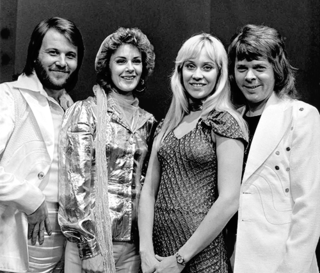
ABBA are a Swedish pop supergroup formed in Stockholm in 1972 by Agnetha Fältskog, Björn Ulvaeus, Benny Andersson, and Anni-Frid Lyngstad. The group's name is an acronym of the first letters of their first names arranged as a palindrome. They are one of the most popular and successful musical groups of all time, and are one of the best-selling music acts in the history of popular music.

Björn Kristian Ulvaeus is a Swedish musician, singer, songwriter, and producer best known as a member of the musical group ABBA. He is also the co-composer of the musicals Chess, Kristina från Duvemåla, and Mamma Mia! He co-produced the films Mamma Mia! and Mamma Mia! Here We Go Again with fellow ABBA member and close friend Benny Andersson. He is the oldest member of the group.
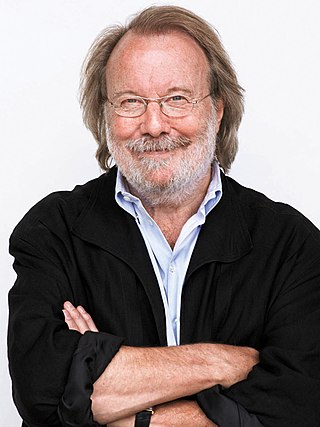
Göran BrorBennyAndersson is a Swedish musician, composer and producer best known as a member of the pop group ABBA and co-composer of the musicals Chess, Kristina från Duvemåla, and Mamma Mia! For the 2008 film version of Mamma Mia! and its 2018 sequel, Mamma Mia! Here We Go Again, he worked also as an executive producer. Since 2001, he has been active with his own band Benny Anderssons orkester.

Waterloo is the second studio album by the Swedish pop group ABBA, and the first released internationally. It was originally released on 4 March 1974 in Sweden through Polar Music. The album's title track won ABBA the 1974 Eurovision Song Contest and became a global hit, launching the group's career.
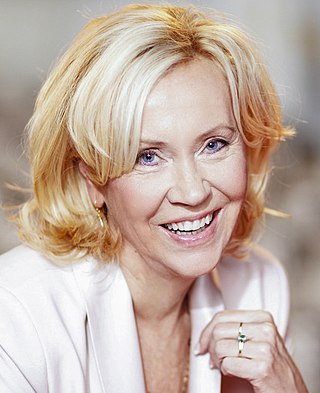
Agneta Åse Fältskog, known as Agnetha Fältskog and AnnaFältskog, is a Swedish singer, songwriter and a member of the pop group ABBA. She first achieved success in Sweden with the release of her 1968 self-titled debut album. She rose to international stardom in the 1970s as a member of ABBA, which is one of the best-selling music acts in history. She is the youngest member of ABBA, and the only one born in the 1950s.

"Mamma Mia" is a song by the Swedish pop group ABBA, written by Benny Andersson, Björn Ulvaeus and Stig Anderson, with the lead vocals shared by Agnetha Fältskog and Anni-Frid Lyngstad. It is the opening track on the group's third album, the self-titled ABBA (1975). The song was released in September 1975 as its sixth single. The song's name is derived from Italian, where it is an interjection used in situations of surprise, anguish, or excitement. It corresponds to the English interjection "my, my!" The song was ABBA's first number one in the UK since "Waterloo" in 1974.

"Dancing Queen" is a song by the Swedish group ABBA, released as the lead single from their fourth studio album, Arrival (1976). It was written by Benny Andersson, Björn Ulvaeus and Stig Anderson. Andersson and Ulvaeus also produced the song. "Dancing Queen" was released as a single in Sweden in August 1976, followed by a UK release and the rest of Europe. It was a worldwide hit. It became ABBA's only number one hit in the United States, and topped the charts in Australia, Canada, Denmark, the Netherlands, Belgium, Czechoslovakia, Ireland, Mexico, New Zealand, Portugal, Norway, South Africa, Spain, Sweden, the United Kingdom, West Germany and the Soviet Union. "Dancing Queen" also reached the top five in many other countries.

ABBA is the third studio album by the Swedish pop group ABBA. It was originally released on 21 April 1975 through Polar Music and featured the hits "SOS", "I Do, I Do, I Do, I Do, I Do" and "Mamma Mia".

Björn Again is an ABBA-based musical tribute act from Australia, featuring performers from various countries. The name references ABBA's Björn Ulvaeus. The band has given performances worldwide, including one for Russian president Vladimir Putin in 2009.

"Waterloo" is a song recorded by Swedish pop group ABBA, with music composed by Benny Andersson and Björn Ulvaeus and lyrics written by Stikkan Anderson. It is first single of the group's second album of the same name, and their first under the Atlantic label in the United States. This was also the first single to be credited to the group performing under the name ABBA. The title and lyrics reference the 1815 Battle of Waterloo, and use it as a metaphor for a romantic relationship. The Swedish version of the single was backed with the Swedish version of "Honey, Honey", while the English version featured "Watch Out" on the B-side.
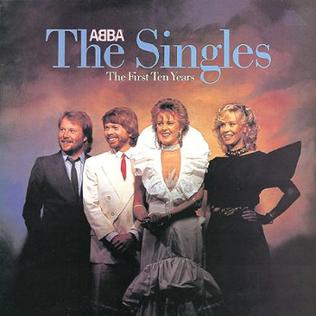
The Singles: The First Ten Years is a double compilation album by Swedish pop group ABBA, released in November 1982.

"One of Us" is a song by Swedish pop group ABBA. It was released in December 1981 by Polar Music as the lead single from the band's eighth studio album, The Visitors (1981). Written by Benny Andersson and Björn Ulvaeus, who also produced it, the song has lead vocals by Agnetha Fältskog and is about a woman trying to revive a relationship she had ended. It would become ABBA's last major hit for 40 years, and the last No. 1 single of their career, topping the charts in Belgium, Denmark, West Germany, Ireland and the Netherlands. "One of Us" was also a top-10 hit in countries like Austria, Norway, South Africa, Spain, Switzerland and the UK. In the US, where it was released in 1983, it only charted on the Billboard Bubbling Under the Hot 100 chart and the Adult Contemporary chart, peaking at number 107 and 33, respectively. The music video for the song was directed by Lasse Hallström, featuring Fältskog as a woman moving into her new house. "One of Us" has since been covered by Pandora in 1995, A-Teens in 1999 and Cher in 2018.
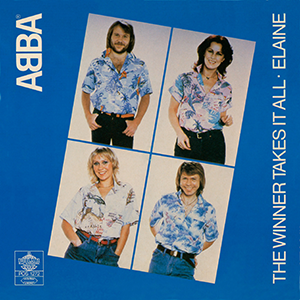
"The Winner Takes It All" is a song recorded by Swedish pop group ABBA. Released as the first single from the group's seventh studio album, Super Trouper (1980), it is a ballad in the key of G-flat major, reflecting on the end of a relationship. The single's B-side was the non-album track "Elaine". The song peaked at No.1 in several countries, including the UK, where it became their eighth chart-topper. It was also the group's final top 10 hit in the United States. It was written by Björn Ulvaeus and Benny Andersson, with Agnetha Fältskog singing the lead vocal.
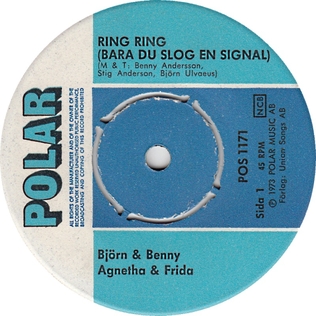
"Ring Ring" is a song by Swedish group ABBA, released as the title track of their 1973 debut album. The single gave the group their big break in several European countries (although the rest of Europe, North America and Australia would be introduced to ABBA the following year). The song was written in Swedish by Benny Andersson and Björn Ulvaeus, along with their manager Stig Anderson, with an original title of "Ring Ring (Bara du slog en signal)" ("Ring Ring (If Only You Called)"). Translation into English lyrics was helped by Neil Sedaka and his collaborator Phil Cody. The Swedish version reached No. 1 in the Swedish charts.

"Lay All Your Love on Me" is a song recorded by Swedish pop group ABBA in 1980 for their seventh studio album, Super Trouper. The song was not intended to be a single but after a remixed version gained popularity in nightclubs, the song was released as the album's sixth and final single in the summer of 1981, eight months after the album's release. At the time, it was the highest selling 12-inch record in UK chart history, where it peaked at No. 7.

"Does Your Mother Know" is a song by Swedish pop group ABBA. It was the second single taken from their sixth studio album, Voulez-Vous, as was the B-side, "Kisses of Fire". The track is notable for its emphasis on male vocals, performed by Björn Ulvaeus, with female backing vocals.

"Honey, Honey" is a song by the Swedish pop group ABBA. It was released as the second single from their second studio album, Waterloo, after the success of the title track at the 1974 Eurovision Song Contest.

"Thank You for the Music" is a song by the Swedish pop group ABBA. It was originally featured on the group's fifth studio album, The Album (1977), and was released as a double-A sided single with "Eagle" in May 1978 in limited territories, namely Belgium, the Netherlands, Germany, France, Austria, Switzerland and Australia. In South Africa where it peaked at number 2 in August 1978 and became the eighteenth best-selling single of that year.

"On and On and On" is a pop song recorded by Swedish pop group ABBA. It was released as a single in a limited number of countries in 1980 as the second single from their seventh studio album, Super Trouper.
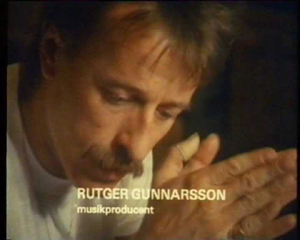
Johan Rutger Gunnarsson was a Swedish musician, bass guitarist, guitarist, arranger and producer. He was closely associated with the pop group ABBA.
References
- ↑ "Ola Brunkert: Unsung drummer who provided the beat for Abba" . The Times . No. 69274. London. 18 March 2008. p. 75.
- ↑ Petterson, Tobias (2007). Henningsson, Ulf (ed.). The Encyclopedia of Swedish Progressive Music 1967–1979: From Psychedelic Experiments to Political Propaganda. Stockholm: Premium Forlag. p. 134. ISBN 978-9189136229.
- ↑ Anderson, Benny; Ulvaeus, Björn; Craymer, Judy & Dodd, Philip (2006). Mamma Mia! How Can I Resist You?: The Inside Story of Mamma Mia! and the Songs of ABBA. London: Weidenfeld & Nicolson. p. 15. ISBN 9780297844211.
- ↑ Elkin, Mike (18 March 2008). "Abba drummer bleeds to death in glass accident". The Times. No. 69274. London. p. 47.
- ↑ "Abba drummer found dead in Spain". BBC News. 2008-03-17.
- ↑ Ola Brunkert at Discogs
- ↑ CNN Report